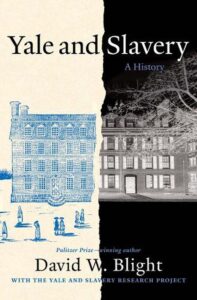Report: Yale’s Ties to Slavery
Since October 2020, the Yale and Slavery Research Project has conducted intensive research to provide a clearer and more comprehensive understanding of the university’s past involvement with slavery. The research project included faculty, staff, students, and New Haven community members, and was led by David W. Blight, Sterling Professor of History.
During their research, members of the group shared results publicly, and Yale sometimes launched or modified programs in response. Earlier this month, the group and Yale released some major works and announced some major initiatives.
 The first deliverable was, of course, a scholarly, peer-reviewed book published by Yale University Press: Yale and Slavery: A History, authored by Blight and members of the Yale and Slavery Research Project. Key findings and the full book are available online as a free pdf.
The first deliverable was, of course, a scholarly, peer-reviewed book published by Yale University Press: Yale and Slavery: A History, authored by Blight and members of the Yale and Slavery Research Project. Key findings and the full book are available online as a free pdf.
But don’t buy the book or struggle with the 447-page pdf. Instead, check out this multi-media website that walks you through the history, starting in 1636, with the European interactions, and sometimes enslavement, of indigenous peoples in New England.
That website uses some advanced javascript and HTML to allow you to VISUALLY look through the key developments, bullet points, copies of documents or maps and pictures of the people involved (i.e., paintings pre-1860 and photographs post-1860). There are even some very short videos embedded tastefully in the flow of the explanations. Take for example, this three-minute “video explainer” of a group portrait of Elihu Yale in 1719, presented by the Director of the Yale Center for British Art.
On Feb. 16, Yale University marked a milestone in its comprehensive, long-term examination of the university’s historical role in and associations with slavery. Not only did it publish the book and release the website, but it also released a statement acknowledging the ways that slavery benefitted the development of the University. It also announced several new commitments and actions in response to its findings.
The book, “Yale and Slavery: A History,” which is available in a free digital version, was authored by Yale Professor David W. Blight with the Yale and Slavery Research Project, a group convened in 2020 to better understand the university’s history — specifically its formative ties to slavery and the slave trade. The group included faculty, staff, students, and New Haven community members. You can see a photo slideshow and watch a recording of the full event.
The findings of the Yale and Slavery Research project, Salovey said, “provide a deeper, more honest understanding of who we are and how we got here.
“The efforts of the team give us a necessary foundation from which to build a stronger, more knowledgeable and more vibrant university — indeed a more vibrant society.”
Other speakers included Kimberly Goff-Crews, the university secretary and vice president for university life; Blight, Sterling Professor of History and African American Studies and director of the Gilder Lehrman Center for the Study of Slavery, Resistance, and Abolition at Yale; and project member Charles Warner, chairman of the Connecticut Freedom Trail, member of the Amistad Committee Inc. Board of Directors, and chairman of the Dixwell Congregational Church History Committee.
Learn about the project and its findings at the Yale and Slavery Research Project website.

